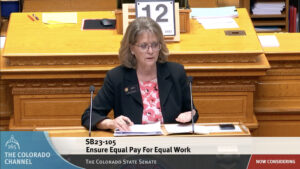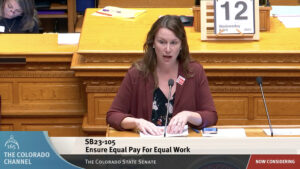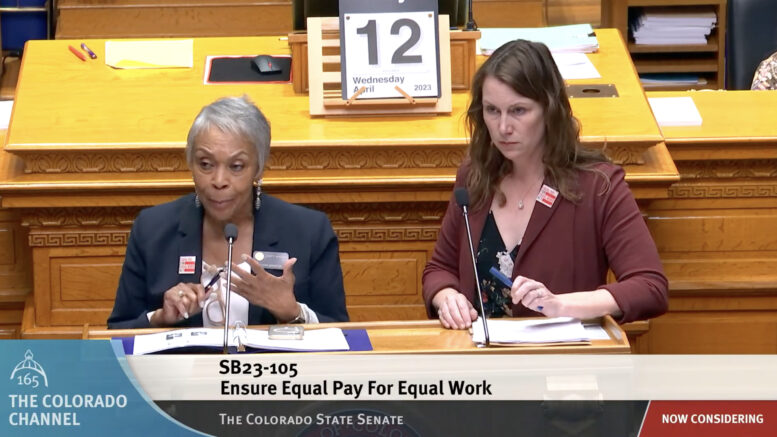Sponsors rejected a handful of amendments — including one requested by Gov. Jared Polis’ office — during Colorado Senate debate over the past two days on an update to the Equal Pay for Equal Work law, leaving the fate of the business-opposed bill in the hands of the House.
Senate Bill 105, sponsored by Democratic Sens. Jessie Danielson of Wheat Ridge and Janet Buckner of Aurora, comes two years after implementation of a law that added transparency measures to the recruiting and hiring process that are designed to end the gender wage gap. Those included a ban on asking the past or current salaries of job applicants, a requirement that open positions must be posted for everyone in the company to see and a mandate that advertisements for job openings include the proposed salary range.
The law garnered Colorado national attention in 2021 when roughly 100 national companies advertised remote positions with the caveat that residents of this state need not apply — a provision that allowed those without physical offices here to avoid requirements of the law. Business groups, including the Colorado Chamber of Commerce, have been working with the Colorado Department of Labor and Employment since that time to discuss possible cleanups of the statute that honor its purpose while removing some of its most burdensome provisions.
Instead of offering a regulatory ramp-down, particularly in the area of remote hiring, SB 105 increases some of the requirements on employers through the law. While it does remove some job-posting requirements when employees are rising to new positions through natural career progression, it also doubles to six years the amount of back pay that workers can collect if they can prove they were a victim of gender-based discrimination.
What business leaders wanted

Colorado state Sen. Barb Kirkmeyer speaks Wednesday on the Senate floor against Senate Bill 105.
During late-night debate on Wednesday, Sen. Barbara Kirkmeyer, R-Brighton, introduced several amendments to try to give business leaders the relief they have been seeking since 2021, all of which were rejected by majority Democrats. Those would have exempted collective bargaining agreements with unions from the law’s requirements, limited CDLE’s ability to investigate potential violations to those made in official complaints and limited global companies’ requirement to post open jobs to those positions that could be filled by someone in Colorado.
Kirkmeyer also introduced an amendment suggested by the Democratic governor to try to deal with the spate of job advertisements banning Colorado applicants, which CDLE can do nothing to stop if the companies don’t have a physical presence in Colorado. The proposed change — which would have exempted from the law companies without a physical presence here that are looking for remote workers and employ no more than 15 state residents — also failed when no Democrats stood up to speak for it.
“This is something we just can’t accept,” Danielson said, noting that CDLE has contacted firms using anti-Coloradan verbiage in their ads and has reduced the number of such postings over the past two years. “Excluding (protection for) remote workers goes against the core intent of the measure.”

Colorado state Sen. Jessie Danielson speaks Wednesday for her proposed update to the Equal Pay for Equal Work law.
A frustrated Kirkmeyer said, however, that the result of the current law aiming to protect female workers has been to reduce the number of jobs for which those workers can apply. After Danielson noted that studies have shown that the majority of remote workers are women, Kirkmeyer noted those women lose opportunities when companies won’t advertise for Coloradans, pointing out that a similar law in California exempts remote-work notices.
Next step for Equal Pay law
“It puts Colorado at an economic disadvantage. But more importantly, it’s putting Colorado women at a disadvantage,” Kirkmeyer said. “No one said they were opposed to equal pay for equal work. But there are a lot of clarifications that could have occurred in this bill to make it less confusing for employers.”
The bill passed the Senate Thursday by a margin of 24-11. Republican Sen. Perry Will of New Castle joined with all Democrats in the chamber to approve it over the objections of all the other Senate Republicans.
Buckner and Danielson both argued that the law and all its provisions remain necessary because women working comparable jobs earn just 83% of male counterparts nationally. That number shrinks when comparing specifically Black or Hispanic women to males, Buckner said.
SB 105, which the nonpartisan Legislative Council estimated will cost Colorado officials about $1.2 million to enforce with nine new employees, heads now to the House, where Democrats hold a 46-19 advantage. Business groups will continue to try to press their case about tweaks they believe need to be made.
